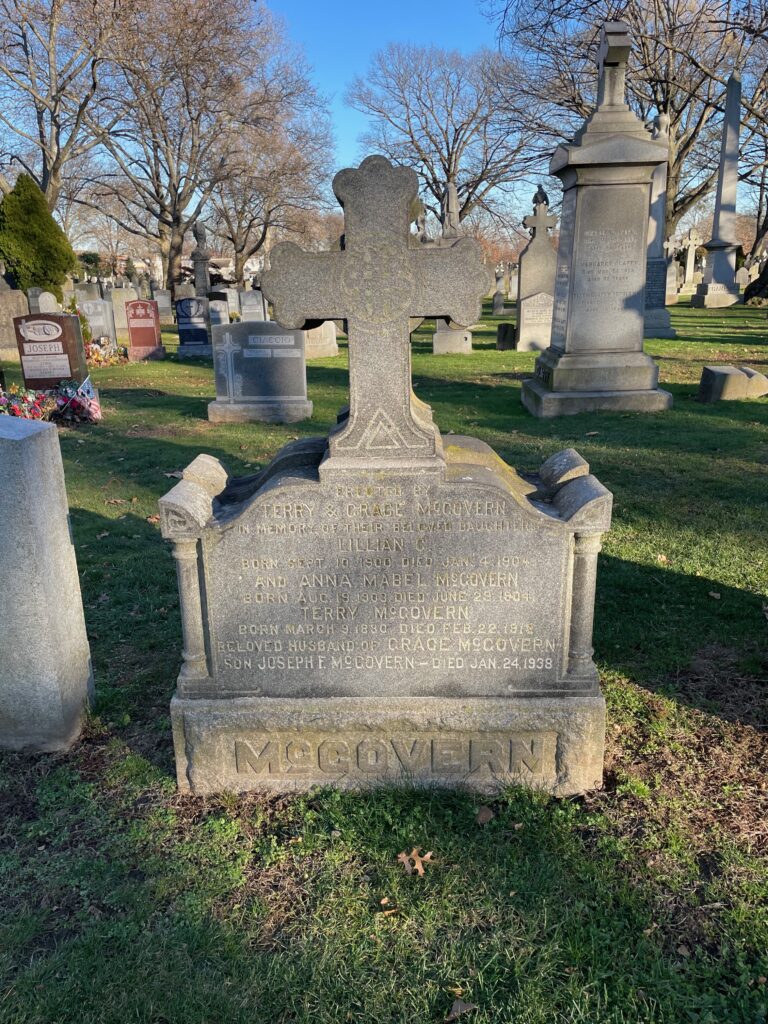Erik Visits an American Grave, Part 1,291
This is the grave of Terry McGovern.

Born in 1880 in Johnstown, Pennsylvania, McGovern grew up in an Irish immigrant household. His father died while he was young and the family moved to Brooklyn. They were very poor. McGovern sold vegetables on the streets to bring a little bit of cash into the family, but it wasn’t much. But this was the golden age of boxing, at least in terms of its importance to Americans. Along with baseball, it was the national pastime. And lots of young men with not much else going on would take their shot in the ring. Anything for a chance for wealth. Most of them would go nowhere. Terry McGovern would go somewhere.
McGovern went pro in 1897. He was a small guy and fought in the featherweight and bantamweight classes. Heavyweights were where the real national interest was–the heavyweight champion was seen as the King of American Men, which is why people freaked out when Jack Johnson won the title. Well, that and the racism. Anyway, by 1899, McGovern won the bantamweight title. Even this match though, when he defeated the British boxer Pedlar Palmer (good name), drew around 10,000 people. Again, boxing was a big freaking deal. The Marquis of Queensbury Rules were just enacted and when McGovern knocked Palmer out in the first round, it was the first time this had happened under the new rules.
Time for a side story. The Marquis of Queensbury Rules came from the current holder of that title in Britain. He was one of the rich people of the turn of the century Anglo-Saxon world who was obsessed with the connections between sports, masculinity, and war. He wanted to make boxing respectable so that Good Men could come watch it and take inspiration from it as they prepared for the ultimate manly challenge of war. In the U.S. context, you need to think of Theodore Roosevelt here. How could the rough and tumble street fighting style of bare knuckle boxing translate to respectability? Rules, gloves, referees, etc. But like lots of this type, Queensbury was obsessed with masculinity in many of its forms. And so when he found out that his son was having sex with Oscar Wilde, Queensbury went nuts and it was him who prosecuted Wilde and had him sent to the hard labor camp that ruined the great writer’s health and eventually killed him. Masculinity and male bonding, yes. Homosexuality, no. Such was the fine line these upper class masculinity fetishists of the time had to walk.
McGovern was a fast, aggressive boxer who hit hard for a little guy. He was pretty popular too–an Irish guy in New York who wore green trunks for his Irish pride was always going to have some fans. When McGovern took on George Dixon, a Black boxer from Canada who was the first Black man to win any boxing championship, it was a huge deal, one of the most bet upon fights of the era. It should of course be known that part of the reason that boxing was one of America’s great pastimes is that it fit so well with the other great pastime of gambling.
Well, McGovern was a legend but it wasn’t to last all that long. He lost his featherweight title in 1901 to Young Corbett II (another quality name). He was still relevant for a good many years yet, but never quite reached the pinnacle of his early career. After 1906, he slipped from the ring. Although complete records are a bit inconsistent at this time, his official record was 65-5 with 5 draws, but there were almost certainly more fights than this. Sometimes these fights were a mere week apart from one another, just too often for anyone to recover from the first one.
In fact, McGovern probably had taken too many shots to the head and he began to slip in general. He lost all his money on the ponies, both betting and investing in horses. He also started to show clear signs of mental illness. He was institutionalized frequently and worked odd jobs when he could. He was still a local legend, but that didn’t exactly pay the bills or clear his head. He died of a combination of pneumonia and Bright’s disease in 1918. He was 37 years old. Luckily for his widow, his manager had taken over his funds and unlike the classic story of the manager or other hangers on sucking away the money, in this case, the guy actually did maintain what was left of the money and was able to see that his widow got $10,000.
Terry McGovern is buried in Holy Cross Cemetery, Brooklyn, New York.
If you would like this series to visit other legendary bantamweights, you can donate to cover the required expenses here. Oliver Cook is in Doe Run, Missouri and Harry Forbes is in Forest Park, Illinois. Previous posts in this series are archived here.


